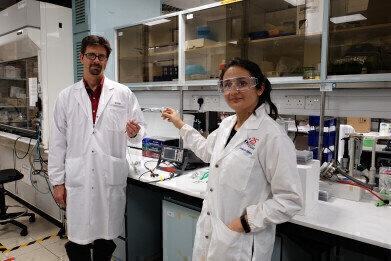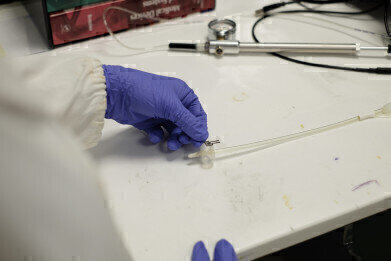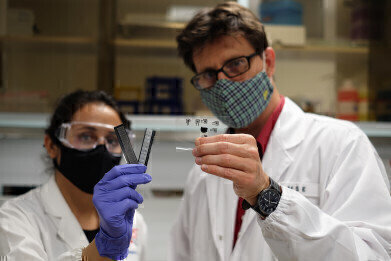-
 (from L-R) Associate Professor Terry Steele from the NTU School of Materials Science and Engineering and former NTU PhD student Dr Manisha Singh, now at the Massachusetts Institute of Technology (MIT). Credit NTU Singapore
(from L-R) Associate Professor Terry Steele from the NTU School of Materials Science and Engineering and former NTU PhD student Dr Manisha Singh, now at the Massachusetts Institute of Technology (MIT). Credit NTU Singapore -
 A patch of Voltaglue is attached to the catheter's balloon, where it will inflate in a broken blood vessel to seal up the hole. Credit NTU Singapore
A patch of Voltaglue is attached to the catheter's balloon, where it will inflate in a broken blood vessel to seal up the hole. Credit NTU Singapore -
 (from L-R) Former NTU PhD student Dr Manisha Singh, now at the Massachusetts Institute of Technology (MIT) and Associate Professor Terry Steele from the NTU School of Materials Science and Engineering hold up different patches of Voltaglue. Credit NTU Singapore
(from L-R) Former NTU PhD student Dr Manisha Singh, now at the Massachusetts Institute of Technology (MIT) and Associate Professor Terry Steele from the NTU School of Materials Science and Engineering hold up different patches of Voltaglue. Credit NTU Singapore
News & Views
NTU Singapore Scientists Develop System to Deliver Electrically-activated Glue for Sealing Defects in Broken Blood Vessels
May 23 2021
A team of researchers led by Nanyang Technological University, Singapore (NTU Singapore) has developed a device that offers a quicker and less invasive way to seal tears and holes in blood vessels, using an electrically-activated glue patch applied via a minimally invasive balloon catheter.
This device could eventually replace the need for open or keyhole surgery to patch up or stitch together internal blood vessel defects.
After inserting the catheter into an appropriate blood vessel, the glue patch - nicknamed ‘Voltaglue’ - can be guided through the body to where the tear is located and then activated using retractable electrodes to glue it shut in a few minutes, all without making a single surgical cut.
Patented by NTU and Massachusetts Institute of Technology (MIT) scientists, Voltaglue is a new type of adhesive that works in wet environments and hardens when a voltage is applied to it.
The catheter device that deploys Voltaglue is jointly developed by Associate Professor Terry Steele from the NTU School of Materials Science and Engineering, former NTU PhD student Dr Manisha Singh, now at MIT, and Associate Professor Ellen Roche from the Department of Mechanical Engineering and Institute for Medical Engineering and Science at MIT, USA.
This catheter device is the first proof-of-concept application of Voltaglue in a medical setting since it was invented by Associate Professor Steele in 2015.
More information online
Digital Edition
International Labmate 49.6 - Sept 2024
September 2024
Chromatography Articles - HPLC gradient validation using non-invasive flowmeters Mass Spectrometry & Spectroscopy Articles - From R&D to QC, making NMR accessible for everyone: Putting NMR...
View all digital editions
Events
Oct 30 2024 Birmingham, UK
Oct 30 2024 Manchester, UK
Nov 11 2024 Dusseldorf, Germany
Nov 12 2024 Cologne, Germany
Nov 12 2024 Tel Aviv, Israel


.jpg)















